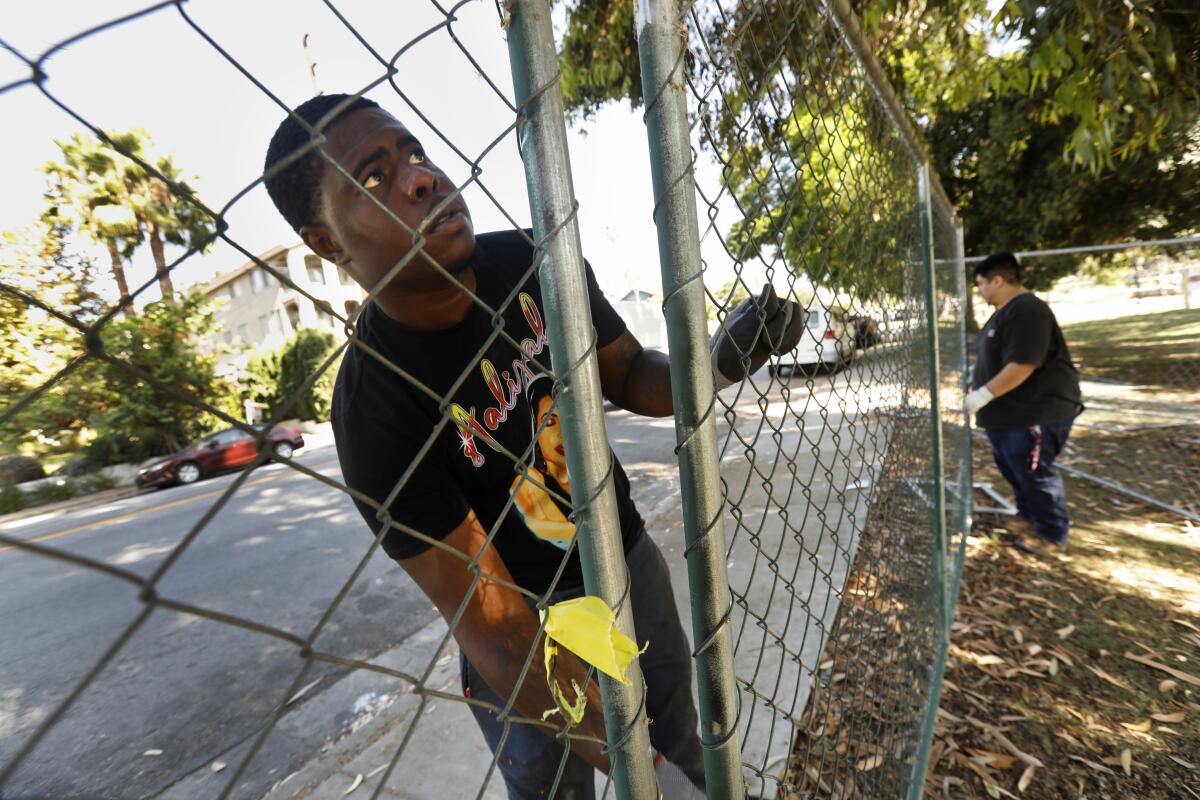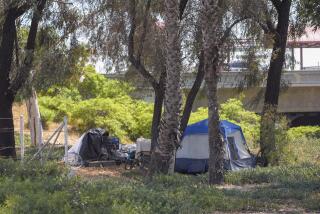Opinion: Removing the Echo Park Lake fence is a gesture, but no real help for our unhoused neighbors

- Share via
When the City of Los Angeles cleared away the Echo Park Lake homeless encampment in March 2021, a crowd of police went in to arrest the final holdouts. I was one of the people protesting this decision. The situation in Echo Park Lake had long been untenable, but the sweep seemed typical of larger policy failures, with the city pushing the unhoused around like game pieces while ignoring the underlying issues causing the situation.
When the park reopened two months later, it was behind a chain fence. I hated it. I thought the fence was an embarrassment, a constant reminder of our comprehensive inability to address the homelessness crisis.
If you had told me then that two years later I would greet the fence’s removal with ambivalence and apprehension, I would have been horrified — yet this is exactly how I feel about the plan by newly elected councilmember Hugo Soto-Martinez to remove it. When announcing this decision, the council member stated, “For many in the community … the fence symbolizes division and the biggest failure of homeless policy in Los Angeles. … We will take down the fence, and we will take painstaking care to do it right, with more transparency, so the City can see once and for all that criminalization and segregation don’t solve homelessness.”
Echo Park Lake looks very different now than it did two years ago. The lawn is healthy, the pathways clean and well-maintained and new gym equipment has been recently installed. It is busy most times of the day and night, and apart from the ubiquitous swan boats, people paint, exercise, chat, read, fish and enjoy the striking views of Downtown L.A. Individuals of different races and backgrounds, housed and unhoused, take advantage of the space and view the park has to offer.
But what you see outside its gates is very different. Tents dot the perimeter. Overpasses are lined with encampments. RVs crowd the streets. It is a daily occurrence to view some desperate soul in the midst of a break with reality, screaming at the sky or engaged in otherwise psychotic behavior. Public nudity, urination and defecation are likewise common. These issues are not solely about quality of life — last summer an encampment in a nearby public stairwell caught fire and came within a few feet of burning down my house.
As a longtime advocate for the unhoused, I know that there is no quick or easy solution to the tragic reality of homelessness in our city. The problem is the result of systemic failures going back generations. As it stands, there are some 36,000 more unhoused individuals than there are beds in supportive housing and shelters within L.A. County. The number of people living on our streets has grown steadily over the last several years and shows no signs of stopping.
Soto-Martinez assures us that removing the fence will be twinned with a vigorous effort at outreach to help unhoused people in the surrounding area. I have the highest regard for the council member and his team, but they cannot compensate for our fundamental lack of housing and infrastructure. Funneling resources toward specific areas or encampments means others of equal need are ignored. It seems arbitrary and unfair to prioritize assisting the people experiencing homelessness who happen to live near Echo Park Lake over those half a mile down the road.
In all likelihood, removing the fence will result in a return to people setting up camp in Echo Park. This decreases its value to the rest of the public, without offering any meaningful benefit to the new inhabitants. The fundamental difficulties that unhoused people face — not only absence of shelter but lack of access to medical care and increased risk of theft and violence — remain unchanged whether one sleeps inside or outside of a park. Those who oppose the fence, as I did when it was first installed, may do so for aesthetic or philosophical reasons, but they cannot pretend that its removal will do anything to better the lives of the people experiencing homelessness in the neighborhood.
Addressing the homelessness crisis requires widescale reformation of our housing and job markets as well as our mental health system. Serious attempts in any of these areas should be supported. In the meantime, we must recognize that we are not currently capable of guaranteeing housing or mental health care to Angelenos. I am ashamed of this. Perhaps you are as well. But finding comfort in symbolic efforts is not the way to escape this disgrace or address the larger problem.
I hope that in a few months Echo Park Lake remains the vibrant community space it is today. But I fear removing the fence will end up a pointless act of penance that will rob the neighborhood of a small bastion of comfort.
Daniel Polansky is a baker and writer living in Los Angeles.
More to Read
A cure for the common opinion
Get thought-provoking perspectives with our weekly newsletter.
You may occasionally receive promotional content from the Los Angeles Times.










